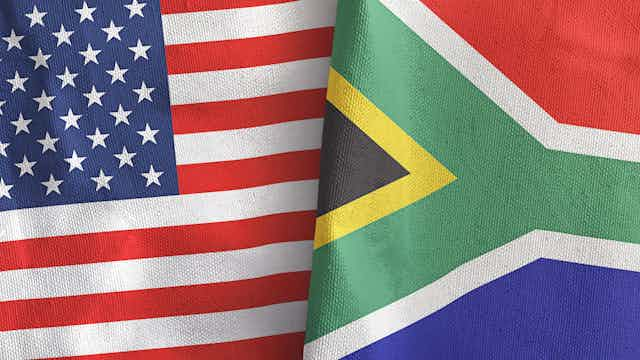South Africa must tread carefully in its economic relationships to avoid being caught in the escalating tension between east and west, and more specifically China and the US. The country’s hosting, and the outcome, of the 2023 Agoa Summit should strengthen its role in diplomatic relations and contribute towards safeguarding the country’s economic interests.
From 2-4 November 2023, the US and 35 sub-Saharan African countries will meet in Johannesburg for the 20th Africa Trade and Economic Cooperation Forum (Agoa Forum). It entails strengthening trade and investment ties between the US and sub-Saharan Africa through the Africa Growth and Opportunity Act (Agoa), US legislation which provides various trade preferences to eligible countries in the region.
Given Russia’s continuing war in Ukraine and its rising tension with Nato, plus the China-US trade war, tensions between east and west are high. South Africa has come under attack for its non-alignment role in the Ukraine war. It refused to support UN resolutions condemning Russia. This resulted in some US congressmen pushing for the forum to be moved out of South Africa.
The country recently hosted the 15th Brics summit, which resolved to expand the Brazil, Russia, India, China and South Africa grouping to 11 member states. The enlargement will bolster Brics’ role as a geopolitical alternative to the west, which is dominated by the US. Might this be a direct challenge to American hegemony?
I have been researching major global economic developments, such as globalisation and the impact of the 2008 global financial crisis, for 20 years. This body of work shows the risks that come with behaviour like South Africa’s. The country could find itself in the middle of a tense situation.
South Africa needs to pull off an exceptional balancing act in managing its international relations in a sensible way that protects and advances its economic interests.
Note that the geopolitical tensions between China and the US are not just about trade disputes. They also include espionage, China’s Belt and Road Initiative, climate change and environmental issues, and tensions over Hong Kong, Taiwan and South China Sea disputes.
As a major source of infrastructure financing to sub-Saharan Africa, China is now the region’s largest bilateral official lender. Its total sub-Saharan African external public debt – what these governments owe to China – rose from less than 2% before 2005 to over 17% in 2021.
Agoa might present a challenge to China as competition for its own interests in Africa. China would like African countries to untie or loosen their agreements with the US. It is thus a good moment to take stock of the actual benefits South Africa has derived from the Agoa agreement with the US.
What Agoa is about
The Agoa agreement was approved as legislation by the US Congress in May 2000 for an initial 15 years. On 29 June 2015 it was extended and signed into law by then president Barack Obama for a further 10 years to 2025.
It will come into review again in 2024, hence the importance of the upcoming summit. Recently, Louisiana senator John Kennedy introduced a bill to the US Congress to extend Agoa by a further 20 years to 2045. This is a bid to counter China’s growing influence in Africa, and to continue to allow sub-Saharan African countries preferential access to US markets.
Agoa’s benefits to South Africa
In 2021, the US was the second most significant destination for South Africa’s exports worldwide, mainly thanks to Agoa. China took the top spot; Germany was third. The US ranked third as a source of South Africa’s imports, following China and Germany. In that year, the total trade volume between South Africa and the US reached its zenith at $24.5 billion, with a trade imbalance of $9.3 billion in South Africa’s favour.
Agoa offers preferential entry for about 20% of South Africa’s exports to the US, or 2% of South Africa’s global exports. The stock of South African investment in the US has more than doubled since 2011, amounting to US$3.5 billion in 2020. American foreign direct investment (FDI) in South Africa increased by over 70% over that period, to US$10 billion. This made the US South Africa’s fifth largest source of FDI in 2019. The US was its third largest destination for outward FDI.
US investment in South Africa is mainly concentrated in manufacturing, finance and insurance, and wholesale trade, which is vital for economic growth. American multinationals doing business in South Africa employ about 148,000 people.
More specifically, Agoa’s benefits include:
duty-free and quota-free access to the US market for a wide range of South African products. This benefits South Africa’s textile and apparel industry in particular. To sub-Saharan African countries, Agoa provides duty-free access to the US market for over 1,800 products. This is in addition to the more than 5,000 products that are eligible for duty-free access under the US Generalised System of Preferences programme
export diversification, especially of items such as agricultural products, textiles, and manufactured goods. This is vital for increasing export earnings, which help to improve South Africa’s balance of payments, particularly its trade account.
capacity building through technical assistance and programmes to help South African businesses meet US standards, thus becoming more competitive in the global marketplace.
economic development and poverty reduction, which aligns with South Africa’s developmental goals.
Balancing economic interests
China is the largest consumer of South African commodity exports, and thus a key influencer of the rand exchange rate. In addition, China and Russia’s planned move towards de-dollarisation (trying to replace the petrodollar system with their own system) puts American interests under threat. This means South Africa needs to carefully navigate its relations with the US and its Brics partners, China and Russia.
It will want to keep strong ties with the US through Agoa without getting into a difficult position between China and the US. The outcome of the November meeting will have serious economic implications.

